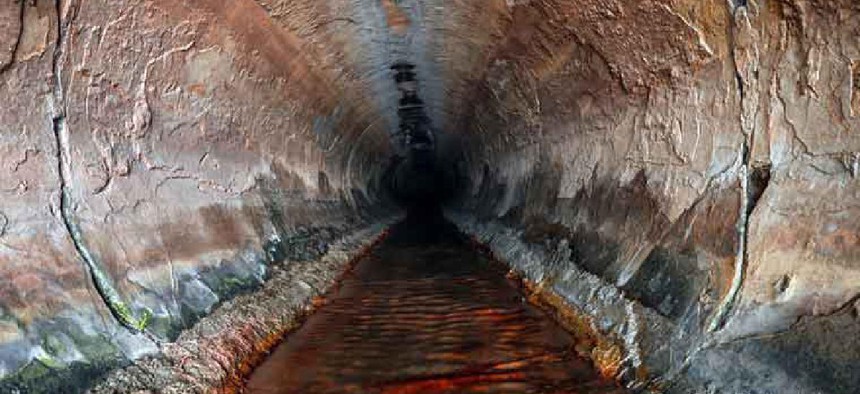Connecting state and local government leaders
Pipe Sleuth classifies sewer defects from videos, delivering s a consistent, more accurate view of what’s happening in the water infrastructure running under the nation’s capital.
Fatbergs, beware.
An algorithm developed by the District of Columbia Water and Sewer Authority (DC Water) with IT firm Wipro helps sewer pipe technicians get a consistent and more-accurate view of what’s happening in the network running under the nation’s capital.
The software application, dubbed Pipe Sleuth, analyzes video that autonomous robots from RedZone Robotics captures to identify and classify anomalies based on industry standards and best practices. Those anomalies are structural, such as cracks and joint separations, and maintenance-based, such as grease build-up or plant roots.
“It’s basically facial recognition … for sewer pipes,” said Thomas Kuczynski, vice president of IT at DC Water.
Technicians program a path for the robots, which Kuczynski likened to a hot dog on wheels with 360-degree cameras on the front, send them into the sewer system via a manhole and retrieve them at another manhole. The distance they cover depends on what needs to be inspected, but most videos run about 20 to 30 minutes, he said.
The video is then uploaded into a DC Water server and processed through Pipe Sleuth, which reviews the footage, scores the pipes according to industry standards and produces a report showing imagery of the defects with a bounding box that is color-coded based on defect type. The report also provides details on where the defect starts and ends on the pipe.
Human technicians review the videos with the highest scores -- meaning the pipes with the most problems -- as well as the lowest, to check for false positives and negatives. They feed any discrepancies into the neural network model to improve its detection capabilities.
“As it pulls frames from a new video, it applies them to the neural network to classify the defect,” Kuczynski said.
Currently, the algorithm can spot nearly 50 different defects, mainly in vitrified clay and concrete pipes, although Kuczynski said the agency is testing the algorithm to find problems in cured-in-place pipes, in which a liner is inserted into a pipe and heated to stick to the pipe’s sides as reinforcement. The detection rate for vitrified clay is 92% to 95% accurate, and slightly lower for concrete, he added.
Traditionally, DC Water has used CCTV cameras, vehicles and operator stations to inspect sewer pipes. A technician feeds the camera into the sewer and operators navigate it. They watch the video being transmitted back and manually tag defects. Afterward, a certified engineer reviews the video and confirms and scores the defects to produce a report.
That process could take an entire day, but Kuczynski said the automated approach can reduce an hour’s worth of manual work to 10 minutes.
DC Water spent 18 months building Pipe Sleuth with Wipro and has been using it for about a year. So far, the agency has run about 20 of its 1,900 miles of sanitary sewers -- some of which are more than 80 years old -- through the software at a cost of about $3 to $4 per linear foot, he said. By comparison, using CCTV costs $7 per linear foot.
In the past, the agency inspected about 19 miles per year, or roughly 1% of its inventory, but the goal is to increase that to 4% or 5%. “Our hope is that over time, as we move more and more of our scanning to the automated process … then we’ll increase the number of pipes we scan, but at a much lower cost,” Kuczynski said.
Another benefit to Pipe Sleuth is consistency, he added. “All of the video goes through the same algorithm to do all of the detection, whereas when you’re using CCTV, you’re using a number of different operators who have a personal bias to what they’re doing,” Kuczynski said. Additionally, “the software doesn’t get distracted or tired. It processes the video stream irrespective of what’s going on around it, so we think we get a higher-quality result out of it.”
What’s more, officials can use the scoring to prioritize repairs. “As we increase the amount of pipe that we scan, we increase the number of our known known defects, so … we can better target investments," he said. "We get a better return on that investment because we’re fixing more of the really bad stuff vs. fixing just what we know.”
In August 2019, DC Water, through its nonprofit Blue Drop marketing arm, and Wipro began jointly marketing Pipe Sleuth for use by other jurisdictions. They have a trial agreement with Northumbria in the United Kingdom, which has about 20,000 miles of pipe and has used Pipe Sleuth on about 30 miles so far.
The plan is for a portion of the revenue to be reinvested into the product, with the remainder being split between the two entities. Two licensing models are being considered: outright and cost-per-video-scanned.
The algorithm works with any scanning technology and any basic video format, so it’s indifferent to the source of the video or what’s being recorded, making it easily customizable for uses beyond sewer pipes.
“It could theoretically be applied to almost anything,” Kuczynski said. “We’ve talked about doing some inspections of various structures using similar type of technology. I know some folks are using it for stuff like identifying potholes.”
The District is not the only place using robots to trek through sewage sludge. Waxahachie, Texas, and the University of Texas at Arlington are working on a project to use robots to collect data on several miles of the city’s sewer pipelines.
In the U.K., Thames Water has tested autonomous robots outfitted with cameras to gather sewer pipe imagery, and a European Union-funded initiative called SIAR has tested a robot in Barcelona that can make a 3D scan that be analyzed automatically.



